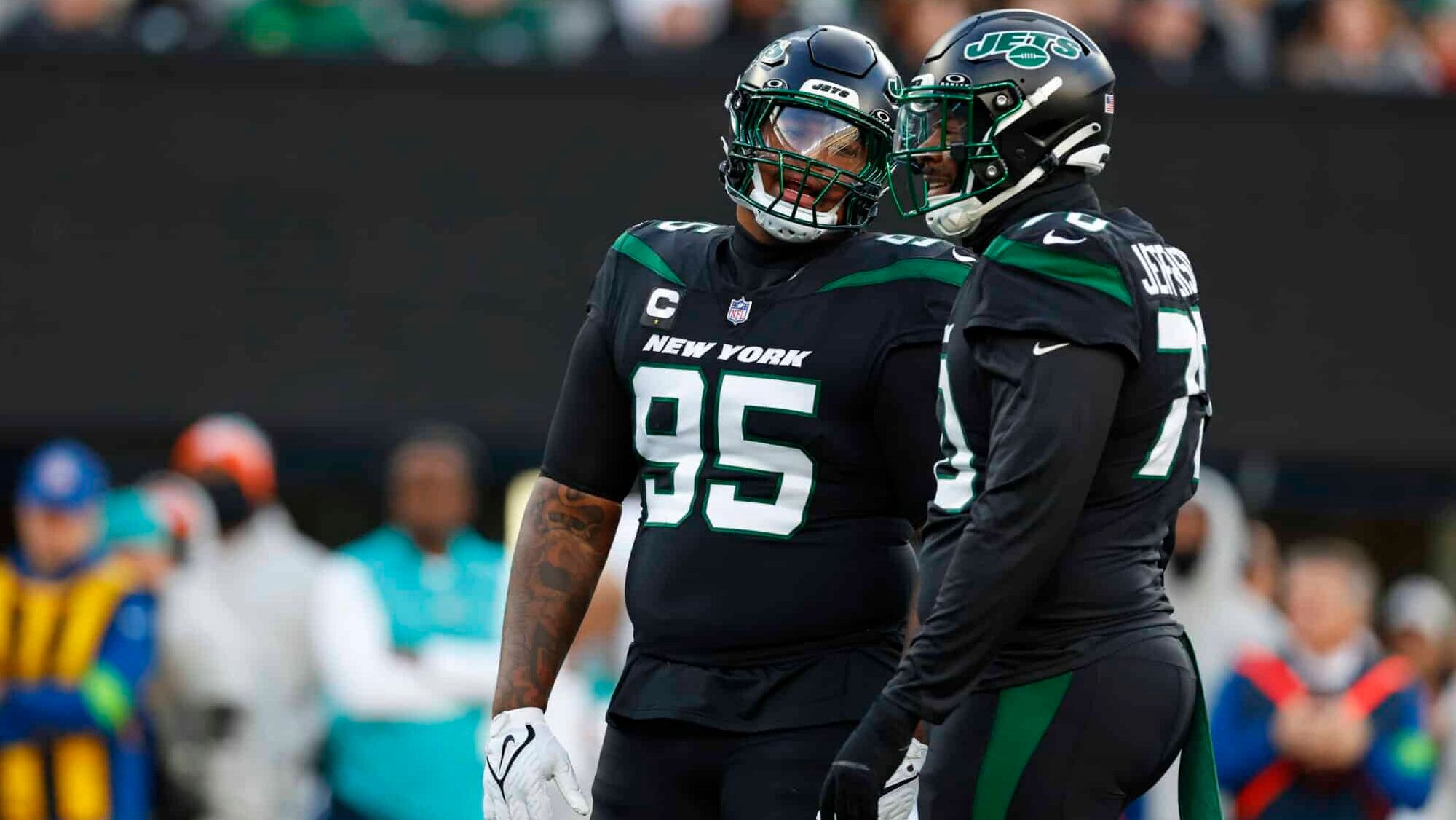C.J. Stroud has been a phenom this season, but the New York Jets have what it takes to stop him
When the New York Jets look at C.J. Stroud, they see what could have been with the No. 2 overall pick. In fact, the Texans’ situation is exactly what the Jets hoped for: miss out on the No. 1 pick but get the better quarterback at No. 2. Alas, things did not work out that way at One Jets Drive.
Expecting the Jets to beat the Texans is likely folly. However, expecting them to make Stroud look mortal is not unreasonable. The rookie still has some weaknesses in his game that the Jets can exploit — and they’re not all that different from what their defense regularly does well.
Flush him out of pocket
According to Pro Football Reference, the Jets are the top pressure team in the NFL. They harass opposing passers on 28% of dropbacks. They also rank third in quarterback knockdown rate at 11.2%. However, they’re just 19th in sacks with 31.
Still, the key with Stroud is getting him out of the pocket, not necessarily knocking him down. Here is the comparison between his numbers inside and outside the pocket (out of 36 qualifiers).
- In the pocket: 106.8 passer rating (3rd), 68.4% completion rate (12th), 8.9 yards per attempt (2nd), 0.15 EPA per dropback (3rd), 49% success rate (7th)
- Out of the pocket: 83.1 passer rating (16th), 45.2% completion rate (27th), 7.1 yards per attempt (12th), -0.20 EPA per dropback (14th), 32.1% success rate (18th)
It’s not that his numbers are bad outside the pocket, but they’re just far more pedestrian, both in comparison to other passers and his numbers in the pocket. Therefore, what the Jets want to do is flush him out. Stroud also has just 23 non-sneak rush attempts the whole season; he’s not looking to run. The Jets’ defensive linemen can pin their ears back and rush without worrying as much about rushing lanes.
Matchups
Furthermore, the weaknesses of the Texans’ offensive line are perfectly set up for the Jets to flush Stroud out. While Houston’s tackles are above average, their left guard and center play have been more suspect.
Rookie second-round pick Juice Scruggs stepped in for the injured Tytus Howard at guard over the last two games. He allowed four pressures over 76 pass-blocking reps, a 5.2% rate worse than the 4.8% league average. His primary matchup will be Quinnen Williams, whose 12.3% pressure rate is nearly identical to what it was last year.
Meanwhile, next to Scruggs, center Michael Deiter has performed at a similar level. He’s allowed a 4.2% pressure rate, also somewhat worse than the 3.9% center average. He’ll face both Williams and Quinton Jefferson, whose 11.6% pressure rate is also nearly identical to his rate from last season.
Although neither of these offensive linemen is significantly below average, they’re the two weakest links in the Texans’ offensive line. The Jets’ defensive tackles have a chance to wreak havoc against Stroud, putting him in a worse position than he’s accustomed to.
Stop the deep ball
Stroud’s success this season has been buoyed by his deep ball. Among 36 qualified QBs (min. 14 deep pass attempts), he ranks second in completion percentage (58.3%), first in yards per attempt (20.2), fifth in touchdowns (7), first in interceptions (0), second in turnover-worthy play rate (1.9%), and first in passer rating (142.4) on passes of 20+ yards. He attempts such throws at about an average rate (11.3%, 20th), but he’s disproportionately successful on them.
However, the Jets are one of the most difficult teams to throw deep against. Even with one of the worst safeties in the league in Jordan Whitehead (8 touchdowns allowed, the most among all defensive players), they’re tied for the fewest passes of 20+ air yards allowed (9).
Even in the intermediate area, where Stroud is also strong, the Jets can counter him. They’re tied for the seventh-fewest receptions of 10-19 air yards allowed (39) and are tied for the fourth-fewest touchdowns on those passes (2).
What the Jets can do is force Stroud into the short passing game, and that’s where the rookie has struggled. On passes of 0-9 air yards, Stroud ranks 32nd in completion percentage (73.8%) and adjusted completion percentage (78%), 27th in yards per attempt (6.1), and 15th in passer rating (98.0). Again, it’s not that he’s been bad in this area — he has a 7:2 TD:INT ratio and just a 1.1% turnover-worthy play rate — but matriculating the ball downfield in shorter spurts is not his forte.
This is exactly what the Jets force teams to do. Some are better at it, but Stroud is more of a Josh Allen gunslinger. Perhaps the Texans’ quarterback will adjust with his favorite deep threat, Tank Dell, out for the season. If he plays his game, though, the Jets are well-suited to stop him.

